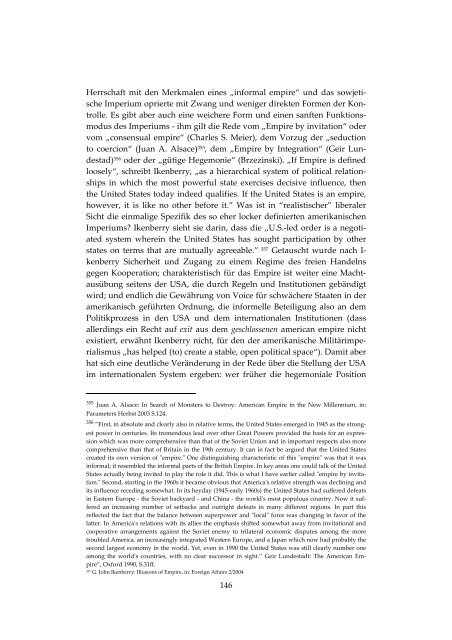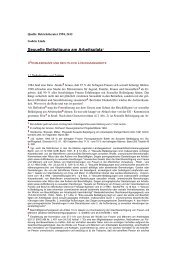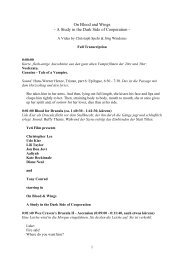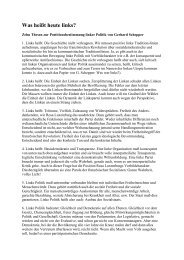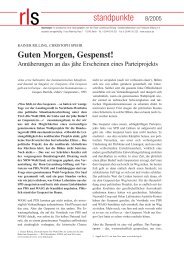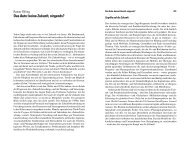outbreak. let's take over. american empire als wille ... - Rainer Rilling
outbreak. let's take over. american empire als wille ... - Rainer Rilling
outbreak. let's take over. american empire als wille ... - Rainer Rilling
Erfolgreiche ePaper selbst erstellen
Machen Sie aus Ihren PDF Publikationen ein blätterbares Flipbook mit unserer einzigartigen Google optimierten e-Paper Software.
Herrschaft mit den Merkmalen eines „informal <strong>empire</strong>“ und das sowjetische<br />
Imperium oprierte mit Zwang und weniger direkten Formen der Kontrolle.<br />
Es gibt aber auch eine weichere Form und einen sanften Funktionsmodus<br />
des Imperiums - ihm gilt die Rede vom „Empire by invitation“ oder<br />
vom „consensual <strong>empire</strong>“ (Charles S. Meier), dem Vorzug der „seduction<br />
to coercion“ (Juan A. Alsace) 355 , dem „Empire by Integration“ (Geir Lundestad)<br />
356 oder der „gütige Hegemonie“ (Brzezinski). „If Empire is defined<br />
loosely“, schreibt Ikenberry, „as a hierarchical system of political relationships<br />
in which the most powerful state exercises decisive influence, then<br />
the United States today indeed qualifies. If the United States is an <strong>empire</strong>,<br />
however, it is like no other before it.” Was ist in “realistischer” liberaler<br />
Sicht die einmalige Spezifik des so eher locker definierten amerikanischen<br />
Imperiums? Ikenberry sieht sie darin, dass die „U.S.-led order is a negotiated<br />
system wherein the United States has sought participation by other<br />
states on terms that are mutually agreeable.” 357 Getauscht wurde nach I-<br />
kenberry Sicherheit und Zugang zu einem Regime des freien Handelns<br />
gegen Kooperation; charakteristisch für das Empire ist weiter eine Machtausübung<br />
seitens der USA, die durch Regeln und Institutionen gebändigt<br />
wird; und endlich die Gewährung von Voice für schwächere Staaten in der<br />
amerikanisch geführten Ordnung, die informelle Beteiligung <strong>als</strong>o an dem<br />
Politikprozess in den USA und dem internationalen Institutionen (dass<br />
allerdings ein Recht auf exit aus dem geschlossenen <strong>american</strong> <strong>empire</strong> nicht<br />
existiert, erwähnt Ikenberry nicht, für den der amerikanische Militärimperialismus<br />
„has helped (to) create a stable, open political space“). Damit aber<br />
hat sich eine deutliche Veränderung in der Rede über die Stellung der USA<br />
im internationalen System ergeben: wer früher die hegemoniale Position<br />
355 Juan A. Alsace: In Search of Monsters to Destroy: American Empire in the New Millennium, in:<br />
Parameters Herbst 2003 S.124.<br />
356 ”First, in absolute and clearly <strong>als</strong>o in relative terms, the United States emerged in 1945 as the strongest<br />
power in centuries. Its tremendous lead <strong>over</strong> other Great Powers provided the basis for an expression<br />
which was more comprehensive than that of the Soviet Union and in important respects <strong>als</strong>o more<br />
comprehensive than that of Britain in the 19th century. It can in fact be argued that the United States<br />
created its own version of ʺ<strong>empire</strong>.ʺ One distinguishing characteristic of this ʺ<strong>empire</strong>ʺ was that it was<br />
informal; it resembled the informal parts of the British Empire. In key areas one could talk of the United<br />
States actually being invited to play the role it did. This is what I have earlier called ʺ<strong>empire</strong> by invitation.ʺ<br />
Second, starting in the 1960s it became obvious that Americaʹs relative strength was declining and<br />
its influence receding somewhat. In its heyday (1945-early 1960s) the United States had suffered defeats<br />
in Eastern Europe - the Soviet backyard - and China - the worldʹs most populous country. Now it suffered<br />
an increasing number of setbacks and outright defeats in many different regions. In part this<br />
reflected the fact that the balance between superpower and ʺlocalʺ force was changing in favor of the<br />
latter. In Americaʹs relations with its allies the emphasis shifted somewhat away from invitational and<br />
cooperative arrangements against the Soviet enemy to trilateral economic disputes among the more<br />
troubled America, an increasingly integrated Western Europe, and a Japan which now had probably the<br />
second largest economy in the world. Yet, even in 1990 the United States was still clearly number one<br />
among the worldʹs countries, with no clear successor in sight.” Geir Lundestadt: The American Empire”,<br />
Oxford 1990, S.31ff.<br />
357<br />
G. John Ikenberry: Illusions of Empire, in: Foreign Affairs 2/2004<br />
146


